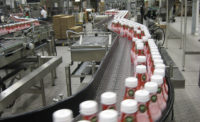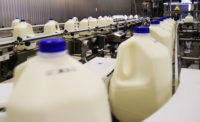Adding private label accounts to keep the dairy plant busy
Besides manufacturing foods and beverages, dairies offer services such as package design and logistics.

If you manufacture branded dairy foods, then you should consider taking on private label products if you have the capacity. By manufacturing foods and beverages for other companies, dairy plants can keep their production lines moving.
Sales of private label store brands reached an all-time record of $118.4 billion in 2015, up 2.2% over the previous year and 5% over the past two years, while the dollar share of private label hit another all-time high of 17.7%, up 2% over 2014, according to the Private Label Manufacturers Association.
Many subcategories within the dairy case saw slight declines at supermarkets, although many of those subcategories already had significantly higher market share for private label than in other parts of the grocery aisles. Among the subcategories with the largest sales and dollar share for private label dairy were:
- Milk, with $6.1 million in sales and a 56% dollar share;
- Cheese, $4.6 million sales, 39% share;
- Cottage cheese, sour cream and toppings, $895 million sales, a 37% share;
- Butter and margarine, $868 million sales, a 31.2% share.
Other subcategories within dairy had more modest private label success, including yogurt ($474 million sales, 9% dollar share) and dairy puddings and other desserts ($11.7 million, 3.9% dollar share).
Simona Faroni, co-founder of G.S. Gelato, a manufacturer for retail and foodservice based in Fort Walton Beach, Fla., said “the store brand is created with much more interest at heart from the retailers’ standpoint for their consumers, to create loyalty and to offer quality products for a better value.”
Among the newest lines of private label brands is PICS, sold at Price Chopper Supermarkets and Market 32. The company is transitioning 2,000 Price Chopper products to PICS, designed to convey that products are “hand-picked.” Dairy products include coffee creamer and sherbet.
GS Gelato has been making private label frozen yogurt for 19 years and has seen the market grow “exponentially” in the past eight or nine years, Faroni said. GS Gelato customizes each formulation as well as packaging options, she said.
“We work very closely with all of our clients to develop from ideation to shelf their perfect program,” with services including research and development, custom flavor creation, packaging and design, and logistics and distribution, Faroni said. Some of GS Gelato’s contract manufacturing clients already have formulations in place, so “we take their recipe and produce it,” she said.
Consultant Tom Kelman of Marshall, Wis., helps companies with ice cream and frozen novelty brands. His company, Kelman Consulting, similarly provides a variety of services depending upon what clients seek, such as formulating concepts, finding ingredients, putting together nutritional information for labels, brokering agreements between clients and their contract manufacturing partners, going on site to observe test runs, and helping fine tune and tweak the product, Kelman said.
Finding a contract manufacturer with economies-of-scale congruent to the client can be a challenge, Kelman said. “You can’t take someone who has a small volume into a place that’s used for long production runs and churning out thousands of gallons, or tens of thousands,” he said. “Smaller folks starting out are looking for smaller production runs. Those facilities are a little bit more difficult to come across.”
Kelman said trust is necessary to cement a consultancy relationship. “My client isn’t necessarily going to be on site 100% of the time,” he said. “You’ve got to have that trust between the two of you that, ‘Here’s how we set up the product, this is what I’m expecting,’ and getting that each and every time, that same quality level.”
Looking for a reprint of this article?
From high-res PDFs to custom plaques, order your copy today!






